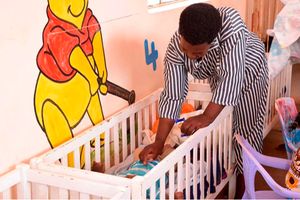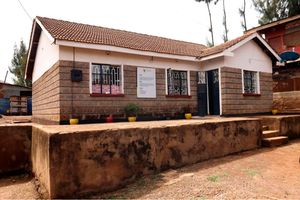
Life in prison is tough, and reintegration into the world after years of imprisonment is quite difficult.
Lifestyle spoke to former women prisoners regarding the experience of raising a child in prison, and the challenges that accompany integration after release.
*Akinyi, 47, visibly carries the weight of her four-year imprisonment at Lang’ata Women’s Prison. Dressed in black trousers and an oversized sweater, her long, unkempt dreadlocks tell a story of hardship, but also resilience.
Over a cup of strong coffee, six teaspoons to be specific, and three sugars, she shares her tale of betrayal, incarceration, and the struggles of raising a child born in prison.
“I was arrested in November 2005 and charged with robbery with violence—a crime I never imagined I’d be entangled in,” she says.
Before imprisonment, she was a simple broker, connecting farmers who wanted to sell their chicken with a contact person in Kariokor market, Nairobi, who bought in bulk.
“I lived in Kayole. It was my daily routine: find a farmer and connect them to the buyer,” she explains.
There was a man in her neighborhood, in his 30s, who sold roasted maize. She would stop by his stall to chat before heading home. They became acquaintances, and he often asked her about her work.
“I told him what I did. One day, he asked me about the man I sold chickens to and how many he bought them. Soon after, he mentioned he had a friend who owned 2,000 chickens and suggested I ask my contact if he was interested in buying them,” she recalls.
The chickens were somewhere along Kangundo Road, so they planned a visit.
“There were six of us, all seated in the Kariokor seller’s car. None of us knew the place, so the maize vendor gave directions. The road was rough and bumpy. Then, out of nowhere, the car stopped. The maize vendor started barking orders at my contact, demanding he hand over all his money. My contact said he had no money. They shot him. The sound of the gunshot still echoes in my mind,” she says.
Seeing blood, Akinyi and a friend who had accompanied her jumped out of the car and ran.
“It was around 11am, and the commotion drew people to the scene. The maize vendor and his friend drove off. When people arrived, they assumed we were the killers. The police came, arrested us, and took us to the Kayole police station. They beat us, demanding we reveal the identities of the killers, but I barely knew the maize vendor—I didn’t even have his number,” she says.
“Before we went to court, we were taken to the Office of a Chief Magistrate. I’ll never forget her. She prayed for me and urged me to tell my story. She told me I was going to suffer greatly and that I would be sent to Lang’ata Women’s Prison. I wrote down my confession, but a police officer later advised me to deny everything in court, so I did. We were sent to Lang’ata, and after two weeks, we returned to court for the mention of our case. This cycle continued for three months, and then, after four long years, the magistrate released me,” she says.
During her time in prison, Akinyi found out she was pregnant.
“I must have been about a week along when I was arrested. I gave birth in prison and was moved to a different section where they kept nursing mothers. My father took my other children,” she says.
When she was released from jail, she returned home.
“The first thing my father told me was that my children had school fee arrears of Sh13,000, and he demanded I pay. He would come home drunk every day and hurl insults at me. Neighbours would drop by, pretending to borrow things, but I knew they just wanted to see 'mtoto wa jela'—the child I had given birth to while in prison. People spread rumours that I had had an affair with an officer, yet we never interacted with male officers. The rumours hurt deeply,” she says.
She decided to leave and seek refuge with her mother, who lived in a different county.
“My mother couldn’t hide her disappointment and shame. ‘Umeniaibisha,’ she would say. My children stopped going to school. The abuse was relentless,” she says.
She remembered a woman she had met in prison.
“I borrowed Sh1,000, packed our things, and moved to her place in Kayole in 2011. She was doing well, and compared to the life I had been living, it was a relief. I asked her to help me find a job, and she agreed. The next day, she took me to Luthuli Avenue, where she worked. I quickly realised she wasn’t as much of a bar attendant as I had thought. She was a prostitute. She asked if I was willing to do the same. At first, I hesitated, but the thought of my hungry children made me agree. I started working on the streets the next day, and for two years, I sold my body to survive,” she says.
With the money she earned, she rented a house, put her children through school, and life finally seemed bearable.
“I became hardened, indifferent to my circumstances. One of my regular clients befriended me and asked if I wanted a different kind of job. I eagerly said yes, and he found me a position as a saleslady. I worked there from 2013 until 2023, selling cartridges. But the business eventually closed down,” she says.
Life in prison had been brutal, she says. The food was terrible, and when you have a child, there are many things (foodstuff) they never see or taste.
“I remember after our release, the first decent meal we had made us sick all night. My child knew nothing else but the prison routine—waking up, doing squats, and playing when the doors opened. For her, that was normal life,” she says.
Now, even after all these years, her family has never truly accepted her.
“One of my sisters once asked me if I knew anything about a robbery at a neighbour’s house. That question made me realise they still see me as a criminal, untrustworthy,” she says.
If she could speak to her younger self, what would she say?
“I’d tell her to never trust anyone. Life isn’t kind, and women like me need to toughen up. I’ve carried the burden of my past, raising my children like a zombie, voiceless and beaten down by family. But now, I’m ready to seek help, go for therapy, and finally heal from my past. If I were given the chance, I’d open a small dairy business—I know how to bake and make yogurt. I’d start fresh, finally living the life I deserve.”
Beatrice Wairimu’s tumultuous life story began with a rebellious decision to drop out of Form One at 15 to get married. Her life took a devastating turn when, at 16, she was accused of murdering her husband. She was jailed at Lang’ata Women’s Prison while eight months pregnant. She gave birth in remand a month later.
Beatrice was acquitted at the age of 20 and started the hard task of repairing her broken pieces of life. She went back to school, and by the age of 29, she had graduated from university.
Her rough curve in life began with her expulsion from school, which she attributes to a mental disorder that caused frequent bouts of rage and irrational behavior. The stigma of her expulsion not only branded her a troublemaker but also cast her family in a negative light within their village. Driven by the shame, Beatrice fled to Embu County to live with her sister, only to face further adversity.
“The expulsion from school threw me off balance. My parents, who were staunch Christians, became the laughing stock of the village. My father, who was a teacher, became the gossip of the village about how he pretended to teach other people's children while her daughter was a rebellious child,” she recalls.

Jostinah Mwang’ombe-Katana is a senior superintendent of prisons at Shimo la Tewa Borstal Institution and Boys Education Centre, Mombasa County.
She moved out of home and started living on the streets.
One evening, a stranger offered her refuge, only to reveal a darker reality—she was taken in by a man who exploited her as a sex slave.
“At that time, I felt like it was better than staying in the streets,” she says.
It was not long before she became pregnant, and he started physically assaulting her.
“I figured out that as long as he was not killing me I was okay,” she tells Lifestyle.
They moved to Nairobi, but the abuse did not stop.
“Depression set in. This man would leave me for days,” she says.
On the night of May 18, 2008, he returned to their home minutes past midnight and started beating her up for not cooking. What followed is recorded in criminal case 48 of 2008, where she was charged with the offense of murdering Benson Muchangi Njagi.
“I denied the charges and was sent to Lang’ata Women Prison’s remand centre where three weeks later I gave birth to my baby boy, whom I named Genesis,” she said.
At three months, her mother took the baby.
Witnesses
In Beatrice’s case, police signal by the Buruburu police station indicated that when Mr Njagi entered his house, there occurred a fight with his pregnant wife, leading to him incurring severe burns that killed him three days later.
Police Witness 6 testified in court that the deceased had suffered 80 percent burns. The government pathologist, Dr Moses Njue, testifying as witness 11, said his autopsy report concluded that the cause of death was severe burns and associated complications.
“The burns were caused by paraffin and flames. He was burned on both his front and his back...as in the case herein, something like paraffin, which spreads, was used,” he submitted.
In her defense, Beatrice said her violent husband hit her with a stove.
“I ran away, but the paraffin that was in the stove poured on his clothes. He was a smoker, and when he lit up, he exploded into a fireball...I heard him scream, and I’m the one who poured cold water on him to extinguish the flames,” she said, insisting she had no premeditated or otherwise motive to murder him.
Justice Fred Ochieng’, in his November 10, 2011 judgment, observed that the accused relied on the deceased for her upkeep.
“I find it plausible that the deceased may have accidentally spilled paraffin from the stove, onto his clothes, and that his clothing thereafter caught fire when he lit up a cigarette,” he said.
He noted that the investigating officer had found no reason that would be sufficient to cause the accused to want to end the life of her partner.
“But he says that a witness sold paraffin to the accused on the day before the incident. I believe that the investigating officer wanted to suggest that the accused had planned to kill the deceased using paraffin. But the accused admitted having purchased the paraffin for use in the stove, which was for cooking,” Justice Ochieng’ noted.
He added that the prosecution did not prove that on the day when the paraffin was purchased, there was any grudge between the deceased and the accused.
“Therefore, I find the explanation given by the accused to be plausible. Unfortunately, the deceased died in the manner he did. However, I find and hold that the prosecution has failed to prove that the accused is the person who caused the said death. The accused is not guilty,” he declared.
Then came the musical line to Beatrice: “...therefore, I order that she be set at liberty forthwith unless she is otherwise lawfully held.”
Beatrice went back to her parents at Kamwatu village to pick up the broken pieces of her life.
“I went back home as a 20-year-old woman who was now a mother to a four-year-old son, but I was determined to go back to school. I had reflected a lot while in remand and traced my problems from the point I stopped school,” she said.
Some schools refused to admit her, saying she was a bad influence.
When eventually a school admitted her, she was introduced during the parade as a mother and former prisoner.
“Just when I felt I was in the process of starting my journey of rewriting my history amid village stigma, I suffered more in school. Some teachers mocked me about motherhood and remand life,” she says.
In her dilemma, she knew her redemption would only come about by focusing on being exemplary.
“I got a B plain score that saw me admitted to Kenyatta University for my Bachelor’s in Education (Maths and Chemistry),” says the 32-year-old.
She may have triumphed now but she says part of the challenge is that former prisoners cannot get a certificate of good conduct, which in turn has hindered her from getting registered as a qualified teacher by the Teachers Service Commission (TSC).
“Reintegration for those released from prison is tough. In jail at least circumstances are uniform, and all are under one order. Once released you are on your own, and it is very hard for many,” says the now mother-of-three.
Jostinah Mwang’ombe-Katana, 46, a senior superintendent of prisons at Shimo la Tewa Borstal Institution and Boys Education Centre, Mombasa County, speaks about reintegrating ex-prisoners into society.

Jostinah Mwang’ombe-Katana is a senior superintendent of prisons at Shimo la Tewa Borstal Institution and Boys Education Centre, Mombasa County.
“When supporting inmates to return to society, the first question to ask is whether they are ready to return home,” says the Economics graduate who has served in various leadership roles at Wundanyi Women's Prison, Kamae Borstal Institution (the only female facility for juvenile girls under Kenya Prisons Service), Machakos Women Prison, and Busia Women Prison.
“Understanding their fears, family acceptance, and starting anew is crucial. We help them overcome these challenges through training,” says Ms Mwang’ombe.
For those who fear returning home due to fear of facing stigma and family rejection, they assist with relocation and provide temporary rent support. For those returning home, a reintroduction ceremony to celebrate their transformation and return to society is organised.
One of the challenges in reintegrating ex-prisoners is getting the community’s support due to mistrust and financial difficulties.
“Remember prisons offer individuals a second chance. Support them both emotionally and socially. An ex-prisoner can become a morally upright member of society,” she says.








